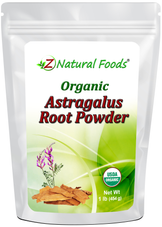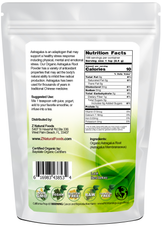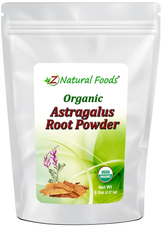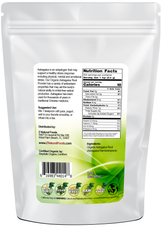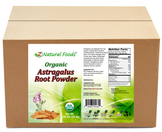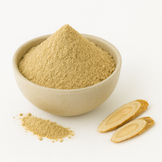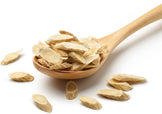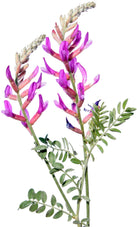Description
Description
Congratulations! You made it to week three of our five-part New Year’s series, which discusses the top five foods and herbs that nourish the immune system.
As we get started, we invite you to review our year-end article reviewing excellent topics on setting your natural food and wellness goals for the new year:
How to set your natural food and wellness goals for the new year
Also, to review the first two articles in this series about supporting a healthy immune system, go here:
Let’s now explore the wonderful benefits of Astragalus!
Astragalus: the premier choice for immune system nourishment
Today’s article discusses the nourishing properties, potential mechanisms of action, and effects on the immune system of Astragalus, traditional Chinese medicine's most extraordinary tonic herb.
We will also discuss the best way to use this miraculous herb known as the king of Qi tonics.
So, let's begin.
A Brief Review of the Medicinal Qualities of Herbs and Food
As a fast recap, here is some crucial information regarding the medicinal qualities of herbs and food.
-
The part of the plant used is vital when determining the action we seek from that plant.
-
Many medicinal plants have parts that can be used as individual entities for acute and chronic illness stages, especially when combined with other supportive herbs.
-
When both parts are combined and used as a whole herb, the same herb can take on a tonic role.
-
Sometimes, determining whether a substance is used as a medicinal or tonic is as simple as selecting the dosage and frequency.
Next, let's review the principles of traditional tonic herbs. Tonic herbs are defined based on function and criteria. In simple terms, four primary fundamental aspects define a tonic herb.
-
They create and support physical, mental, and emotional well-being through the appropriate balance of Yin and Yang energy to attain vibrant health.
-
They can be used for an unlimited period with no adverse effects
-
No matter how long an individual uses tonic herbs, they never build a tolerance.
-
True tonics come from their authentic source and spiritual homeland. This principle is known in Daoist herbalism as Di Tao and makes a vital difference in potency and efficacy.
All tonic herbs nourish at least one of what TCM calls The Three Treasures. The three treasures are interconnected and contribute to overall health and well-being. They are as follows.
-
Jing is essence primarily stored in the kidneys. Jing is one’s constitution, regulates growth and development, and works with Qi to protect the body from harmful external conditions. Poor constitution, blood loss, and excessive sexual activity can cause jing essence deficiencies.
-
Qi is a life force or vital energy stored in the kidneys. Both the physical and emotional are manifested as Qi. One is inherited from our parents, and the second is derived from essential substances like air, food, and water. Deficiencies are caused by poor nutrition and digestion, chronic stress, and constrained breathing.
-
Shen is the emotional and spirit layer of our being that reflects the state of our nervous system. Shen lives in the heart and is said to “preside over the activities that take place in the spiritual and mental planes.” Because Shen lives in the heart, people with disturbed Shen may experience anxiety, stress, difficulty breathing, and insomnia. In such cases, the primary weakness is from the spleen, which cannot generate enough blood to nourish the heart and anchor the Shen.
There are four primary categories of tonic herbs:
-
Qi Tonics
-
Blood Tonics
-
Yin Tonics
-
Yang Tonics
What is Astragalus
Mechanisms of action according to TCM
Astragalus is a major Qi Tonic known as the “Great Protector of Qi” because it fortifies protective Qi, which flows just under the skin and in the muscles.
-
In traditional Chinese medicine, the innate immune system is linked to a concept called Wei Qi, which is the body’s defense energy.
-
This “surface energy” supports the opening and closing of pores, our first line of defense against external environmental changes.
-
In Chinese medicine, the term dampness describes conditions in which an individual cannot properly metabolize fluids.
-
Astragalus is slightly warming with strong supportive qualities for the spleen and lungs (2 organs specific to fluid metabolism) and is known to support “fluid metabolism.”
-
As a “Double-Directional Adaptogen,” it may also support good posture and tonify organs in the abdominal and pelvic cavity.
-
It is well known for its strengthening effects on the outside of the body, specifically on the musculature.
-
Astragalus is traditionally used to strengthen the legs and arms and is commonly used by those who work in a cold environment because it is known to strengthen and warm.
For clarity, when we refer to Astragalus as an “adaptogen,” it is based on TCM’s principle definition. According to TCM, all Qi tonics are considered adaptogens.
A Western perspective of Astragalus
In order to understand a Western medicine perspective on Astragalus, it is vital to discuss what is believed to be one of its primary components: polysaccharides.
In simple terms, polysaccharides are large carbohydrate molecules containing many small sugar molecules (monosaccharides) bonded by a glycosidic linkage (a type of bond that joins a carbohydrate molecule to another group).
They are the most abundant carbohydrate found in food. Polysaccharides consist of more than ten monosaccharide units linked together. Polysaccharides form when monosaccharides and disaccharides link together (resulting from a dehydration process).
The sugars participating in this bond are called residues. It is believed that polysaccharides isolated from astragalus produce immunomodulating effects via activation of toll-like receptor 4 (TLR4)-related mitogen-activated protein kinase (MAPK) activities.
In simple terms, this process represents the first line of defense against infection.
The following was stated in a review discussing the Pharmacological Action of Astragalus Polysaccharide.
-
The main components of A. membranaceus are Astragalus polysaccharide (APS), flavonoid compounds, saponins, and alkaloids.
-
APS, the most critical natural active component in A. membranaceus, possesses multiple pharmacological properties.
-
APS has the vast potential to develop a drug that improves or treats different diseases.
Howe Astragalus affects the immune system: A Western perspective
The influences of Astragalus Polysaccharides on the immune system provide a tonifying and balancing response. Dendritic cells (DCs) are key in activating the immune response, and APS facilitates their growth and maturation.
-
It supports the increased proliferation and differentiation of B and T lymphocytes, a replication process necessary to fight infection.
-
Regulating the balance in the T lymphocyte subgroup- a process that prevents autoimmunity and chronic inflammation.
-
Regulating natural killer cells and macrophages- this interaction is the first line of defense against pathogens.
Furthermore, APS exerts different effects on cytokines under various conditions.
-
Under normal physiological conditions, it can promote cytokine production and enhance immunity.
-
However, APS can reduce inflammatory response factors and protect cells or the body after cytokines increase due to an inflammatory response.
In simple terms, Astragalus has the ability to modulate the immune response.
In conclusion, both traditional Chinese and Western herbal medicine agree that astragalus root extract is best used as a long-term daily tonic to nourish and support a strong, healthy immune system.
Like many tonics worldwide, long-term use leads to cumulative effects that build layers of strength and reserves.
Astragalus root has a warm, bitter, and slightly sweet taste, which allows for great versatility and limitless options. Whether using astragalus to make a tonic tea or broth or simply adding it to your cup of morning joe, consuming nourishing amounts of astragalus is an effortless task.
Astragalus is a premier choice for immune system nourishment, whether used as a stand-alone tonic or combined with other tonic herbs for your specific needs.
For more information about our Organic Astragalus Root Powder, go here:
Organic Astragalus Root Powder
To review all of our Herb & Root Powders, go here:
Herb & Root Powders Collection
The Author’s Bio
Michael Stuchiner is a Master Herbalist and proud graduate of The School of Natural Healing and has worked in different areas of this field for over 25 years. He is a retired elite-level powerlifter who competed for 27 years. As an avid international traveler, he is passionate about the use of medicinal and tonic herbs, as well as foods traditionally found in local markets in the 35 countries he has visited. Michael brings you his years of experience as a Master Herbalist, traveler, and athlete through the hundreds of articles he has written and his YouTube channel (A Master Herbalist Perspective). He is considered a true educator in this field. For more articles written by Mike, go here: Master Herbalist.



